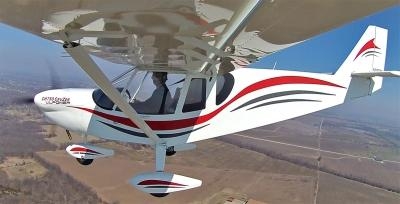Wed, Jul 27, 2016
Building An Airplane And Learning To Fly In It Can Be Done, But There Are Roadblocks
As we’ve been checking out the kit-built airplanes on our third day at EAA AirVenture 2016, we have found more and more people enamored with the idea of building an airplane that do not yet have a pilot license. Building your own airplane and then learning how to fly in it is a rewarding endeavor that has been done, but there are hurdles in your path.

Preflight planning is important before every flight, but building your own airplane and receiving your pilot certificate in it requires the ultimate planning. First and foremost, choose an aircraft to build that has handling characteristics conducive to primary training. Second, and almost equally important, is to plan ahead on who would instruct you in the aircraft. The flight instructor needs to be involved in helping you choose a suitable airplane.
Depending on the pilot certificate you are seeking, training regulations and the practical test standards specify certain required aircraft equipment. If you’re going for sport pilot certificate, meeting the equipment requirements is pretty easy to do. But if you are headed for a private pilot certificate, much more equipment is required for training and testing than is required for a sport pilot.
The big catch comes in the test flying phase of your experimental airplane. Phase 1 flight testing after the homebuilt airplane receives its airworthiness certificate could involve as many as 40 hours of flying that include area restrictions. This test flying must be performed by a licensed pilot and, for the most part, only one person may aboard the airplane in the phase 1 testing. While recent changes do allow a second pilot during flight testing under certain circumstances, including the second pilot for the purpose of flight training is not an acceptable reasons for allowing the second pilot.
This means that someone other than the non-pilot builder will have to do the flight testing. This is obviously an important part of planning prior to starting a building project for the purpose of flight training.
Once the aircraft phase 1 testing is complete, training in the aircraft is legal. It is also legal for the flight instructor to charge for that training. There are rules that prevent an experimental airplane from being used commercially for training, but those rules do not prevent a flight instructor from charging a fee for training as long as there is no fee for the use of an experimental airplane.
Building your own airplane and receiving your pilot certificate in it is not prevented by regulations, but it’s a challenging endeavor.
(Image from file)
More News
DETRESFA (Distress Phrase) The code word used to designate an emergency phase wherein there is reasonable certainty that an aircraft and its occupants are threatened by grave and i>[...]
"General aviation is at the forefront of developing and introducing innovative technologies that will transform the entire aviation industry..." Source: Kyle Martin, Vice President>[...]
Direct Straight line flight between two navigational aids, fixes, points, or any combination thereof. When used by pilots in describing off-airway routes, points defining direct ro>[...]
Aero Linx: Women in Corporate Aviation Women in Corporate Aviation support individuals seeking career advancement and professional development in the business aviation industry. Me>[...]
“We would like to thank the many volunteers that help throughout the year to pull off the event, as well as the several reviewers, judges, and SURVICE staff that provide team>[...]
 ANN's Daily Aero-Term (04.26.24): DETRESFA (Distress Phrase)
ANN's Daily Aero-Term (04.26.24): DETRESFA (Distress Phrase) Aero-News: Quote of the Day (04.26.24)
Aero-News: Quote of the Day (04.26.24) ANN's Daily Aero-Term (04.27.24): Direct
ANN's Daily Aero-Term (04.27.24): Direct ANN's Daily Aero-Linx (04.27.24)
ANN's Daily Aero-Linx (04.27.24) Aero-News: Quote of the Day (04.27.24)
Aero-News: Quote of the Day (04.27.24)



